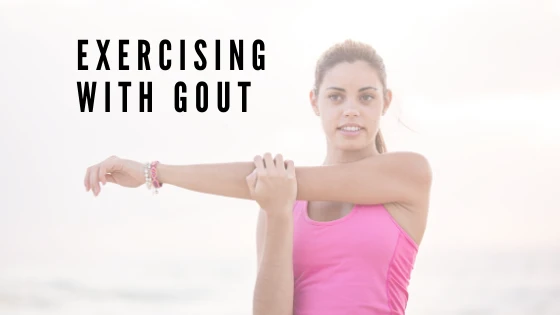Gout can be painful, especially if left untreated. Exercise is a great way to keep your body healthy, and it can have positive effects on gout as well if done on a regular basis. Working out can help a person lose weight and help blood sugar stay lower, which help the body remove excess uric acid.
If you’re living with gout, don’t miss these exercise tips!
- Stretch! Stretching is key to improving flexibility in the body. A 15-minute period of stretching is ideal before working out so you don’t put extra strain on your muscles. If proper stretching exercises are not done prior to working out, your body may be prone to injury during physical activity.
- Wrist stretches – Make a fist with your hand and roll your wrists in one direction for 30 seconds. Repeat in the other direction for 30 seconds
- Shoulder stretches – Place your hands at your side and roll your shoulders forward for 30 seconds. Repeat backwards for an additional 30 seconds.
- Back and hamstring stretches – Sit on the floor with your legs straight out. Reach forward for 15 seconds. Repeat 3 times after the first.
- Aerobic exercises can loosen stiff joints. These exercises include but are not limited to bicycling (stationary or mobile), swimming in warm water, walking, and hiking.
- Resistance exercises are recommended to boost muscle. Weak muscles may be the byproduct of stiffening joints and inactivity. Lifting weights is a great way to build muscle. However, it is important not to put a strain on stiff joints. If weightlifting is for you, start slowly with a lower weight and work your way up.
- Stay hydrated during your workout! When your body is dehydrated, the amount of uric acid in the body rises. This can create an unwanted gout flareup.
- Exercise frequently. Being overweight or obese is a risk factor for Frequent exercise, along with proper diet and hydration can make a positive impact on weight loss.
- Pick up a sport or physical hobby. Sports clubs allow for regularly scheduled exercise, which can help you create a healthy routine.
- Do not exercise during a flare up. During a gout flare up, your goal is to reduce inflammation. Move the affected are as little as possible and apply ice if swelling continues.
Always talk to your doctor before making any major lifestyle changes to get the best advice for you, personally.
If you or a loved one are living with gout, a clinical research trial might be able to help. Learn more by entering your information here:



